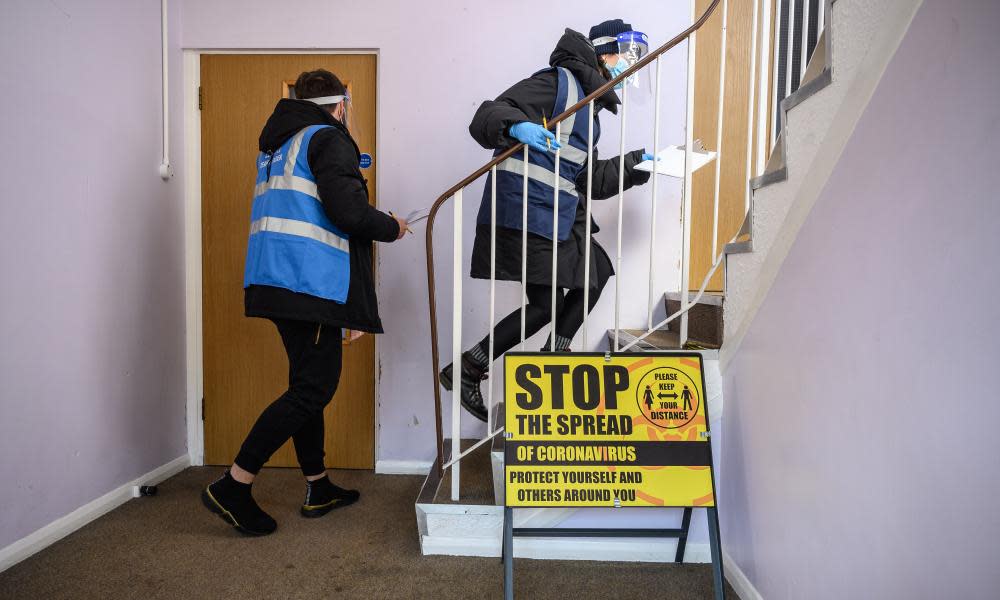New concerns as Indian Covid variant clusters found across England

Clusters of the Indian variants of Covid-19 have been found across England, including in care homes, the Guardian has learned, amid growing fears about the speed with which they are spreading in communities.
The latest update of case numbers of these variants was due to be published on Thursday. But leaked emails seen by the Guardian show the announcement was delayed until at least Friday because of the local elections.
The documents also suggest officials from Public Health England are poised to escalate one of the variants to one “of concern”.
Scientists have been assessing three closely related variants first detected in India and since found in the UK because they may have mutations that help the virus to evade the body’s immune responses and be more transmissible due to their spike protein mutations.
Watch: COVID victims cremated as Nepal suffers virus surge
All three of the variants – known as B16171, B16172 and B16173 – have been designated “under investigation” by Public Health England.
According to internal documents from PHE, dated to 5 May and seen by the Guardian, the assessment of the ongoing risk to public health from B16172 is “high”.
Every week PHE releases new data revealing the latest case numbers of variants that are either under investigation or deemed of concern.
But in an email containing details of the situation, a staff member at the Department of Health and Social Care wrote: “Data publication [is] to be delayed 24 hours from Thursday to Friday given it is local elections tomorrow.”
PHE said the delay was due to “a processing issue”.
In addition, the email said one of the India variants – likely B16172 – could be upgraded to a variant of concern as soon as Friday, as part of a broader set of communications.
In the PHE documents, 48 clusters of Indian variant B16172 have been identified, including those linked to secondary schools and religious gatherings, with evidence of community transmission in some of the clusters.
In London clusters have been located in care homes.
Dr Deepti Gurdasani, a clinical epidemiologist and senior lecturer at Queen Mary University of London, said the variant was “increasing very rapidly” and that “at the current doubling rate it could easily become dominant in London by the end of May or early June”.
The documents reveal 15 cases of B16172 were found in one London care home where residents had their second doses of the Oxford/AstraZeneca vaccine in the week prior to the outbreak. Four of the cases were hospitalised with non-severe illness, and there were no deaths.
It comes as public health officials revealed B16172 has been found for the first time in Northern Ireland, with seven cases confirmed. “While preventive measures – including travel restrictions – are very important, the assessment is that these will delay rather than permanently prevent the spread of variants already detected elsewhere on these islands,” said the chief medical officer for Northern Ireland, Dr Michael McBride, adding the news was not entirely unexpected.
“The most effective way to stop variants developing or spreading is to keep pushing down infection rates and transmission of the virus in our community,” he added. “All variants spread in the same way. We protect ourselves and others by following public health advice and getting vaccinated when our turn comes.”
Cases of the India variants have risen dramatically in recent weeks in the UK. The key driver of the rise appears to be B16172.
Watch: What UK government COVID-19 support is available?
But Prof Ravi Gupta of the University of Cambridge, who researches variant mutations, said he believed all the India variants should be designated variants of concern “given we can’t afford to be wrong”.
Prof Christina Pagel, the director of the clinical operational research unit at University College London and a member of the Independent Sage group of experts, said: “Clearly this variant has escaped into the community and is spreading quickly. It highlights the fundamental weakness of the red list travel system in that we just don’t know where the next dangerous variant is coming from. This should prompt a complete overhaul of our travel policy for the summer.”
Pagel added that the data should have been made publicly available.
“Public Health England are clearly very concerned about the rapid spread of this variant – as they should be,” she said. “But telling the public about a public health emergency should not need to wait for a specific release day or local elections – this should have been communicated earlier, not least to protect communities where the clusters are.”
Related: NHS Covid jab booking site leaks people’s vaccine status
Gurdasani said while research was ongoing to explore the impact of the variants’ mutations, action was needed now, noting that people were continuing to mix, trials around large gatherings were being carried out, there has been a proposed relaxation of some Covid measures in schools, and England was planning to restart some international leisure travel on 17 May.
“What is happening in reality is completely opposite to the stuff that I am seeing from [the PHE documents], which suggests there is cause for actual alarm,” she said.
A spokesperson for PHE said it would not comment on leaked data.
Dr William Welfare, the Covid-19 incident director at PHE, confirmed that there had been clusters in care homes. “Public Health England is monitoring the situation closely and appropriate public health interventions, including targeted testing and enhanced contact tracing, are being undertaken,” he said.


